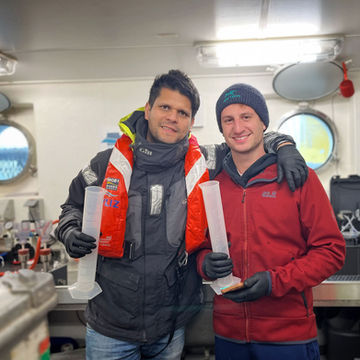


About
We investigate the vital link between marine ecosystems and ocean carbon cycling using innovative remote sensing and in situ observation technologies. Our research covers coastal and open ocean environments and spans seasonal to generational timescales, providing unique insights into the ocean-climate connection.


Our Mission
MarSens is dedicated to advancing knowledge of marine carbon cycling and ecosystem dynamics through the development of innovative remote sensing tools and state-of-the-art in situ observation technologies. Our interdisciplinary approach integrates satellite observation, marine robotics, laboratory and ship-based studies, and modeling work to conduct curiosity- and application-driven research on marine biogeochemistry and ecosystems in a changing environment. By transforming scientific insights into actionable information, we aim to support informed policy decisions that promote sustainable ocean stewardship and environmental resilience.

Our Vision
MarSens strives to lead in marine observation technologies and frontier research advancing knowledge of the ocean-climate nexus. We are dedicated to conducting high-quality and high-impact science with a firm commitment to research ethics and integrity, fostering a diverse and inclusive environment where all members can develop their talents and excel in research, education, and service. We envision an academic culture that values balance, mental health, and team spirit, prioritizing wellbeing alongside achievement. True collaboration, in our view, is achieved through open sharing of data, software, and code, as well as publishing in high-quality open-access journals. Through interdisciplinary research and partnerships, we aim to empower society with knowledge that bridges science, policy, and stewardship, contributing to a resilient and thriving ocean.
Our Research Lines
Ocean Colour Science:
Development and application of algorithms for retrieving essential ocean and climate variables, processing satellite data, performing above-water radiometry, and conducting fundamental studies on light-matter interactions in marine environments.
Marine Biogeochemistry:
Investigating biologically-mediated marine carbon storage, with a focus on the spatial and temporal dynamics of the biological carbon pump.
Technological Innovation:
Designing autonomous sensors for particulate carbon and creating tailored observation systems to enhance marine biogeochemistry monitoring.
Our Tools and Methods

Ocean Color Remote Sensing: Leveraging multi-scale, multi-sensor, remote sensing data to map essential ocean and climate variables, and to conduct time-series and trend analyses in marine environments

Modeling: Developing models to simulate and understand the optical properties of particulate matter and radiative transfer in the ocean.

Laboratory measurements: Conducting lab experiments for sensor calibration/validation, and comprehensively characterizing particulate matter.

Ship-Based Measurements: Collecting detailed optical and biogeochemical data for remote sensing algorithm development and validation. We also design custom autonomous observation systems to enhance marine biogeochemistry monitoring.

Marine robotics: We utilize BioGeoChemical-Argo profiling floats to study the open ocean biological carbon pump, while developing novel sensors for the next-generation of floats with enhanced observational capabilities.



Recent Posts
















